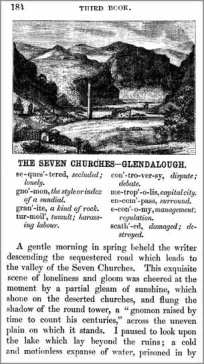Mná na Éireann
“People”
Babies
“Most of the babies were born at home long ago. The midwife would come with her black bag. When we were children, we thought she brought the baby in her bag. I had three stillbirths – my first three children. Eddie Murphy’s father was the grave digger. He came the night they were born with a little box that he made. They are buried in the path around the graveyard, I don’t know where. They weren’t baptised so they weren’t allowed to be buried in consecrated ground. Neither my husband nor anybody from the family went with them to be buried. It was considered unlucky. I often wonder will I see them. Please God, I will! The Church tells us that they are in Limbo. People say that they will have to carry a light for all eternity and that they will never see the face of God.”
“Babies were always christened the day after they were born, not like today where they are nearly able to walk to the church before they are baptised. The mother didn’t go to the baptism. The neighbours would come in after the christening to wet the baby’s head, and silver was put into the shawl with the baby. Usually, two shillings or half a crown. Then, about two weeks after the birth, we had to be churched − that was a blessing for the mother. After Mass the priest would perform the ceremony at the altar rails at the Sacred Heart side [of the Church]. You held a lighted candle in your hands and the priest read prayers over you. You wouldn’t be allowed to receive Holy Communion until you were churched. You where supposed do be unclean. Wasn’t that just like men! I think Pope John XXIII did away with that, God be good to him. He was a great man.”
[ Here is an extract from the 2007 International Theological Commission on The Hope of Salvation for Infants Who Die Without Being Baptised.
“It must be clearly acknowledged that the Church does not have sure knowledge about the salvation of unbaptised infants who die. She knows and celebrates the glory of the Holy Innocents, but the destiny of the generality of infants who die without baptism has not been revealed to us, and the church teaches and judges only with regard to what has been revealed. What we do positively know of God, Christ, and the Church gives us grounds to hope for their salvation…” – Comms Team.]
Children
 “We all came from big families so we were never lonely. There were flocks of us in every townland. We spent our lives running wild through the fields and being fed in every house. The bread and butter you got in your neighbour’s house was always sweeter than what you got at home. Of course, we had all our own jobs to do – looking after the fowl; going for the cows; collecting kippins for the fire; helping with the housework and looking after the smaller children. Somehow, we never looked on it as work. We did our lessons at the kitchen table at night. My mother asked us our catechism and taught us our prayers but I don’t ever remember anyone helping us with our exercises. I loved school, even though the teachers were cross. We learned reading, grammar, letter-writing and sums, and things we would need ‘if we went to America’.”
“We all came from big families so we were never lonely. There were flocks of us in every townland. We spent our lives running wild through the fields and being fed in every house. The bread and butter you got in your neighbour’s house was always sweeter than what you got at home. Of course, we had all our own jobs to do – looking after the fowl; going for the cows; collecting kippins for the fire; helping with the housework and looking after the smaller children. Somehow, we never looked on it as work. We did our lessons at the kitchen table at night. My mother asked us our catechism and taught us our prayers but I don’t ever remember anyone helping us with our exercises. I loved school, even though the teachers were cross. We learned reading, grammar, letter-writing and sums, and things we would need ‘if we went to America’.”
“Our master played the fiddle and taught us all the old Irish songs. I loved poetry and reading. The only reading books we had were our school readers, which was a great pity. They were happy times. We all walked to school barefoot in the summertime. Sometimes we went through the fields. Sometimes we got a lift home on a horse cart. The teacher would say as we left the school, ‘No streeling along the road’. Going home was great.”
